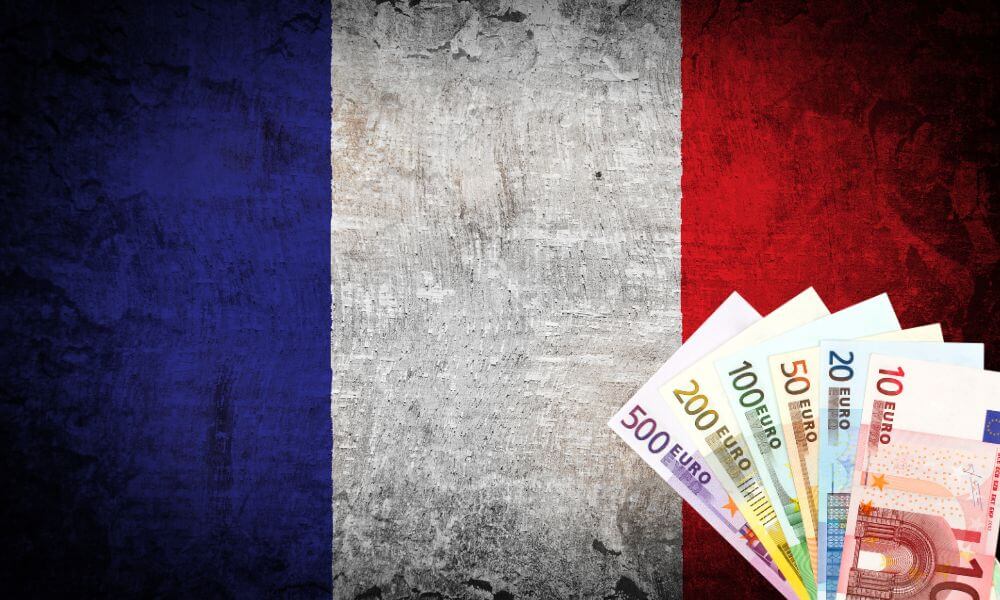The currency of France today is the euro. This is a currency used widely across Europe by member states of the European Union. This was established in 1992 and between 1998 and 2002 the old French currency, the Franc, was converted to Euros. There are 20 Eurozone members.
The euro is one of the most internationally traded currencies in the world, unsurprisingly given it is used by so many nations.
In France, it has played a very important role in the reorganization of the economy after the establishment of the Eurozone and naturally has shaped the country as it is today.
Let’s find out more.

What is the currency in France?
The currency in France today is the Euro.
This is the currency of 20 EU member states and even a few microstates in Europe that are not officially members of the EU.
Of the 27 members of the European Union, then, the majority of them use the euro; these 20 states comprise what is called the Eurozone, which is made up of around 344 million people.
The euro is the second largest reserve currency globally, coming second only to the US dollar.
There are currently around 1.3 trillion euros in circulation.
France officially adopted the euro as their currency in 1999, though conversion from the old currency began the year before.
Up until 2002, old French notes and coins were still being converted to the euro.
The currency itself was first established in the Maastricht Treaty of 1992, and there were a number of criteria member states had to meet in order to be accepted into the Eurozone—for instance, a budget deficit that was less than 3% of the nation’s GDP.
France, naturally, is one of Europe’s biggest economies, and so they had no trouble being granted membership.
Of course, introducing a single currency to so many nations with varying degrees of economic stability presented many problems.
But introducing these criteria, including other things like the debt ratio, low inflation, and low-interest rates went a long way to stabilizing the currency.
Nonetheless, there have been crises over the course of the lifetime of the Eurozone which many felt were simply unavoidable, and that the benefits of such a large, unified economic area far outweighed the problems and potential problems that would have to be faced.
Naturally, then, the euro was not always France’s currency—so what came before?
What was the French currency before the euro?
Before the euro, France used the French franc.
This was a currency that had been in use for a very long time up until the introduction of the euro.
Between 1360 and 1461, a “franc” referred to a coin worth 1 livre tournois, remaining in common speech for a long time.
It was introduced in the modern decimal form in 1795, and was later once again redenominated in 1960.
The franc ultimately derives its origin from the Carolingian monetary system from the 8th Century, though naturally, it underwent many changes over the years.
Coinage and mints have always been a very important part of Royal authority, so of course the franc was rocked considerably by the French Revolution.
But they were not discontinued; rather the authority of the minting and printing of notes was changed.
It was then of course used up until the end of the 20th Century when the euro was finally adopted.
Euro coins and notes fully replaced the franc by 2002, and the currency was entirely discontinued after many centuries of continuous use in some form or another.
This was in contrast to a couple of member states like Denmark and Britain who joined the EU but continued to use their own currency.
Does France still accept francs?
Francs are no longer accepted in France, and have not been for some 20 years.
They have been entirely replaced by the euro, and so even if you still had some lying around somewhere, you would not be able to get them changed into euros.
There was a period, as mentioned, during which all franc coins and notes would be converted to euros, but that is no longer possible.
Euros are the only currency legally used in France and will continue to be so in the future.
Should I take euros to France?
Given the ease of getting good conversion rates on euros just about anywhere in the world, you will probably find it easiest to simply convert your local currency to euros before you leave—the rates on your currency may not be as good in France itself.
You will certainly need euros while you are in France, though modern cash withdrawal machines make currency conversion easier than ever so you may simply withdraw an amount of euros from an ATM when you arrive in France.
But having cash on hand on arrival is always a good idea, so bringing some euros would serve you well.
So, though it is still a relatively recent change in the perspective of the long history of France, the euro is now the only currency in France.
A lot has changed over the course of the last three decades as the euro has changed and grown over time, and France has of course been one of the most important economies in that change.
Given how commonly traded the euro is, you should have little to no trouble getting a good deal on it anywhere in the world.

